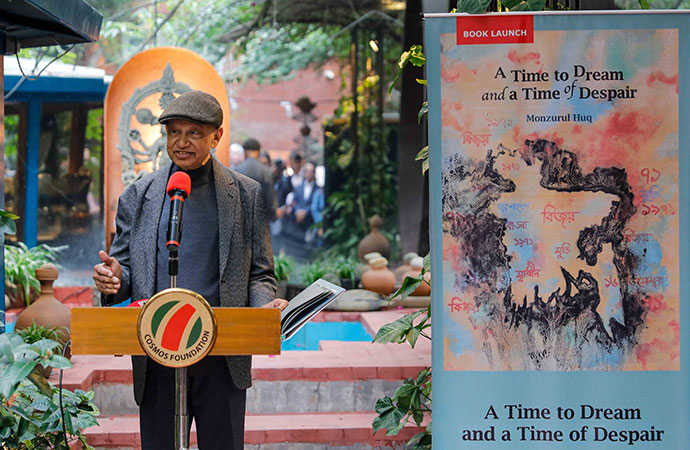Column

Policy discussions on the state and nature of the economy in Bangladesh are dominated largely by experts who have studied in the West where only the formal sector exists. Thus the informal sector is neither studied nor perhaps well understood either by their experts or ours.
Stereotyping the informal sector as "backward"
The informal exists as the stereotype of the bygone era where economic systems were not developed and market rules and regulations were not in place. And the role of the State as a tax collector and distributor and regulator of goods and services to society was not understood.
Most importantly, it was about not understanding the world which the West had conquered but managed poorly. Informality was the symbol of underdevelopment and interestingly produced by inefficient exploitation by the same force. The West never understood it and because the West didn't understand how people could function in the informal world, it was the lesser sector.
The State was accepted as the key performer of efficiency and provider of social service while the market was understood as the provider of profit that the State would spend after the taxpayers. This equation was accepted as the universal matrix and nothing else has space in the western academia. The approach works in the West but our experts study there and are exposed to only one idea while the informal sector dominates much of the development world including us.
The result has been as expected. There are few policy options in Bangladesh which are based on the reality of the situation which shows that the formal is not only smaller but weaker too than the informal. It's not just about what the reality says or why the informal has sustained over time and the nature of the relationships between the two sectors but also suggestions to enhance the formal space even though it doesn't perform well.
The State has in Bangladesh as expected failed to deliver. It's not only weak and inefficient but not formal enough as it has been overrun by regime changes after the same, using violent power changes very informal as far as formal transfer if power is concerned.
It has as yet been unable to find a formula of sustaining and delivering development let alone prosperity. The State has not been "withered" as some Marxists would say because what has not really grown can't wither.
The informal economy: Size and reality
In terms of both size and share of GDP and employment the informal sector ranks higher. But most policy discussions are about steps that can be taken by the formal sector as this is the official sector. Even though the formal sector experts often talk about economic crimes as impediments they don't mention that they are all about the formal sector including banking.
The informal sector's contribution to Bangladesh's GDP is estimated to be around 40% to 65%, depending on various studies. The significant wide range of estimate rather than a specific percentage means that the capacity to measure the size of the informal and formal is itself very limited.
Not only do experts lack the skill set to do so, the informal sector by its very nature is so varied and complex that measuring is not an easy task. Thus there is a great deal of reliance on "educated" guess work in its absence.
A much more reliable indicator of the informal sector's role in creating livelihoods says about its relevance in the overall public life in Bangladesh. It offers opportunities for economic inclusion and growth, particularly for women and youth far more than the public sector. The informal sector employs a vast majority of the Bangladeshi workforce, with estimates ranging from 65% to 85% of total employed population.
It provides employment for the surplus labor that is those who find it hard to find work including women and children who need to work to survive. Non-skilled workforce also finds employment here. In other words, it's a safety net of the social economic variety, a non-statist institution.
So the informal sector by housing 85% of the labour force plays a significant role in poverty alleviation and survival both. As migration economics data shows, it also is the producer of economic betterment for the overwhelming majority including prosperity such as the migrant labour force.
Implications for the apex formal institution: The State
Most of the so-called "reform movement" focuses on the small and not so effective formal sector as they are linked to the State. However, the State as a political institution is not very successful having experienced many regime changes through force and violence partly because it produces less efficiency than needed to survive as a formal institution.
It is also limited to a small group of the total 15% formal economy population who within the state function informally making a formal economy hence a State not possible. The economic benefits of informality in the name of the formal state institutions are high hence the State right now has low chance of success.
However, that is another matter. For the moment, there should be more investment by the private universities - government owned ones may not- in trying to understand and map the informal economic system. Greater understanding by the experts will make the informal and organic socio-economic ecosystem more productive and more will be able to benefit from it.

























Leave a Comment
Recent Posts
Religion and Politics: A Toxic ...
At Dhaka University, cafeteria workers have been told not to wear shor ...
Enayetullah Khan joins AsiaNet ...
AsiaNet’s annual board meeting and forum was held in Singapore, ...
In a New York minute
Many leaders back a UN call to address challenges to ..
Defaulted loans at Non-Bank Financial Institutions ( ..
How the late Zubeen Garg embodied cultural affinitie ..